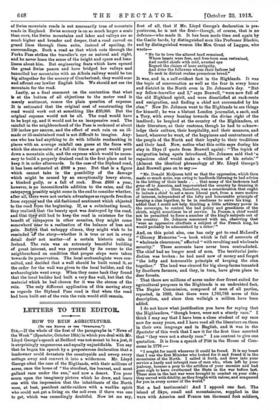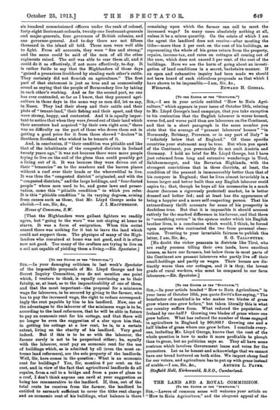LETTERS TO THE EDITOR.
HOW TO RITIN AGRICULTURE.
[To THE EDITOR Cr TH11 ''SPECTATOB,."1
SIB,—If the whole of the first of the paragraphs in "News of the Week " (Spectator, October 18th) in which you deal with Mr. Lloyd George's speech at Bedford was not meant to he a jest, it is surprisingly ungenerous and equally unjustifiable. You say that he began his speech by a preposterous declaration that a landowner could devastate the countryside and sweep every cottage away and convert it into a wilderness. Mr. Lloyd George cited the case of the Highlands, with their millions of acres, once the home of " the sturdiest, the bravest, and most gallant race under the sun," and now a desert. You poor scorn upon the imaginary picture which he drew, and leave one with the impression that the inhabitants of the North were, at best, pestilent cattle-raiders with a warlike spirit who could not get a living on the soil even if there was one to get, which was exceedingly doubtful.. Now let me say, first of all, that if Mr. Lloyd George's declaration is pre- posterous, he is not the first—though, of course, that is no defence—who made it. It has been made time and again by
the Gaelic bards, by distinguished men like Professor Blackie, and by distinguished women like Mrs. Grant of Laggan, who wrote-
" No tie to love the altered land remained,
Where beasts were free, and free-born men restrained,
And sordid chiefs with cold, averted eye Regard the claims of hoar antiquity, And drive the followers whom their fathers led To seek in distant realms precarious bread."
It was, and is, a self-evident fact in the Highlands. It was the topic of conversation as well as the fear in every home and district in the North even in Dr. Johnson's day. "But my fellow-traveller and I," says Boswell, "were now full of the old Highland spirit, and were dissatisfied at rack-rents and emigration, and finding a chief not surrounded by his
clan." Now Dr. Johnson went to the Highlands to see things for himself ; he was a blatant London journalist, a snob, and a Tory, with every leaning towards the divine right of the landlord ; he laughed at the country of the Highlanders, at their literature, at their customs, though he had to acknow- ledge their culture, their hospitality, and their manners, and heard, wherever he went, of the happiness and contentment of the people of the North and their loyalty to their traditions and their land. Now, notice what this critic says during his stay in Skye (I quote from Boswell again) : " The topick of emigration being again introduced, Dr. Johnson said that ' a rapacious chief would make a wilderness of his estate.' " (Almost the identical phraseology of Mr. Lloyd George!) And Boswell goes on to say :—.
" Mr. Donald McQueen told us that the oppression, which then made so much noise, was owing to landlords listening to bad advice in the letting of their lands . . . that many of the tacksmen had gone off to America, and impoverished the country by draining it of its wealth. . . . Ilere, therefore, was a consideration that ought to indude a chief to act a more liberal part, from a mere motive of interest, independent of the lofty and honourable principle of keeping a clan together, to be in readiness to serve his king. I added that I could not help thinking a little arbitrary power in the sovereign, to control the bad policy and greediness of the chiefs, might sometimes be of service. In France, a chief would not be permitted to force a number of the king's subjects out of his country. Dr. Johnson concurred with me, observing that 'were an oppressive chieftain a subject of the French king, he would probably be admonished by a letter: "
And, on this point also, one has only got to read McLeod's " Gloomy Memories "—a book which is full of accounts of " wholesale clearances," effected " with revolting and wholesale severity." These accounts have never been contradicted. The chief had no longer need of men. The territorial juris- diction was broken : he bad need now of money and forgot " the lofty and honourable principle of keeping the clan together." The land was cleared for big sheep farms tenanted by Southern farmers, and they, in turn, have given place to deer forests.
• That there are millions of acres under deer forest suited for agricultural purposes in the Highlands is an undoubted fact. The Napier Commission, composed of men of all parties, reported, in 1892, that there were 1,782,785 acres of this description, and since then wellnigh a million. have been added.
I do not know what justification you have for saying that the Highlanders, "though brave, were not a sturdy race." I
think I may say that I have been a close student of my race now for many years, and I have read all the literature on them in their own language and in English, and it was in the Spectator of this week that I saw it for the first time asserted that " they were not a sturdy race." I am content to give one
quotation. It is from a speech of Pitt in the House of Com- mons in 1776 :-
" I sought for merit wherever it could be found. It is my boast that I was the first Minister who looked for it and found it in the mountains of the North. I called it forth, and drew into your service a hardy and intrepid race of men who, when left by your jealousy, became a prey to the artifices of your enemies and had gone nigh to have overturned the State in the war before last. These men in the last war were brought to combat on your side; they served with fidelity, as they fought with valour, and conquered for you in every corner of the world."
Not a bad testimonial! And I append one fact. The island of Skye, small and mountainous, supplied in the
wars with America and France ten thousand foot soldierst
six hundred commissioned officers under the rank of colonel, forty-eight lieutenant-colonels, twenty-one lieutenant-generals and major-generals, four governors of British colonies, and one governor-general. And to-day there are not fifteen thousand in the island all told. These men were well able to fight. From all accounts, they were " fine and strong," and the same could be said of the men of all the other regiments raised. The soil was able to rear them all, and it could do it as effectively, if not more effectively, to-day. It is rather futile to say that the Highlanders of those days "gained a. precarious livelihood by stealing each other's cattle. They certainly did not flourish on agriculture." The first part of that statement is just as true and as economically sound as saying that the people of Bermondsey live by taking in each other's washing. And as for the second part, no one has ever contended, so far as I know, that they pursued agri- culture in those days in the same way as men did, let us say, in Essex. They had their sheep and their cattle and their plots of " tenant-land," their fishing and their sport, and they were strong, happy, and contented. And it is equally impor- tant to notice that when they were forced out of their land which their ancestors had acquired " by their own right arm," there was no difficulty on the part of those who drove them out in getting a good price for it from those shrewd "dealers" in Southern Scotland who wished to be tenants of it.
And, in conclusion, if "their condition was pitiable and like that of the inhabitants of the congested districts in Ireland twenty years ago," it was not because there were more people trying to live on the soil of the glens than could possibly get a living out of it. It was because they were driven out of their " tenancies " on to the seashore and the barren places without a roof over their heads or the wherewithal to live. It was thus the "congested district" originated, and with the " congested districts," and the large holdings, and " four-footed people " where men used to be, and game laws and preser- vation, came this " pitiable condition " to which you refer. It is this " pitiable condition " in its varying degrees, arising from causes such as these, that Mr. Lloyd George seeks to
[That the Highlanders were gallant fighters we readily agree, but "going to the wars" was not staying at home to starve. It was a form of emigration. When this outlet ceased there was nothing for it but to leave the land which could not support them. The physique of many of the High- landers who remained at home was not good, and it is often now not good. Too many of the crofters are trying to live on a soil not capable of yielding them a living.—ED. Spectator.]















































 Previous page
Previous page